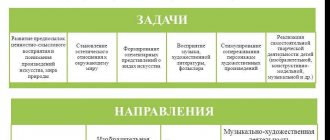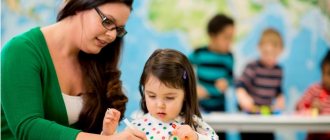Goals and objectives of joint work between teachers and parents
Olga Rogacheva
Goals and objectives of joint work between teachers and parents
Multifunctional manual for parents and teachers “The Most…”
Goals and objectives of joint work between teachers and parents
Raising a child is not limited to the educational institution; the family plays a vital role in how the child develops, his health and emotional well-being. Therefore, the work of teachers with children must necessarily be built in close contact with parents . In essence, this is constant work with parents .
This work with parents will be effective if teachers and parents proceed from agreed views on the goals , means and methods of education, share concern for the emotional well-being of the child and his successful development, and adhere to a common approach in organizing the daily routine, nutrition, hygiene and health procedures. Therefore, parents and educators must become like-minded partners.
To achieve this goal , employees of a child care institution must create the necessary conditions.
Firstly, a children's educational institution must be completely open to the family, both in terms of information and in terms of the direct participation of the family in the educational process. Parents should be aware of the educational services provided in the children's institution, the conditions of the child's stay in the kindergarten, and the features of the educational programs being implemented.
Secondly, employees of a child care institution, in turn, must have an idea of the parents’ , the child’s living conditions in the family, his individual characteristics and create opportunities to obtain such information.
Thirdly, teachers must conduct special work with parents aimed at forming partnerships and attracting families to cooperation. To do this, it is necessary:
establishing trusting relationships between teachers and family members ;
establishing feedback between teachers and parents ;
popularization of modern ideas about child development and education methods;
introduction and development of various organizational forms of cooperation between a child care institution and a family ( parent meetings , family clubs, clubs, joint holidays , trainings, etc.).
The goal of the joint work of teachers and parents is to ensure continuity in the upbringing of the child in the child care institution and in the family.
Relevance:
We are currently faced with the acute question of the problems of parents and children . One of these problems is the family crisis.
Therefore, it is necessary to “return”
parents to the family , help them realize their parental duty to their children , and overcome parental laziness ; uncertainty, to see your parental capabilities .
Every year we have more and more “problem children”
“at-risk”
families .
Teachers find it difficult to communicate and interact with parents . Traditional forms of work - parent meetings, etc. etc., did not justify themselves. Attendance became less and less. Therefore, we need to look for new forms and fill them with pedagogically effective content .
The family has the main social function - raising children; it has been and remains a vital environment for the preservation and transmission of social and cultural values, a determining factor in the formation of the child’s personality. I propose the following form of work with parents - this is a multifunctional manual “The Most…”
.
Target:
Build genuine trust and partnership with the family based on a dialogical strategy of cooperation between teachers and parents . In this regard, to increase the effectiveness of the positive educational influence of the kindergarten on the family, including the problematic one.
Main goals :
Ensuring the physical, mental health, intellectual, aesthetic development of children.
Involving parents in the educational process, developing a competent pedagogical position in relation to their own child.
Raising the professional level of teachers , promoting development and aimed at nurturing a free, creative, successful personality, capable of independent actions and non-standard decisions.
Improving the development environment, creating a creative environment. Medical, psychological, pedagogical support for each child.
Teaching constructive ways of communication to each participant in pedagogical interaction .
Options for using the guide “The Most”
:
“My child is the most…”
Each
parent (other relatives can join)
and a questionnaire.
The goal of the psychologist: to study the range of everyday and educational problems, collect information about the educational position of parents , about the requests of parents .
The goal of the speech therapist : to identify the degree of readiness of parents to cooperate , to determine the level of parental motivation in relation to cooperation with a speech therapist, and also to study child-parent relationships and the intra-family climate.
The purpose of the educator: Analysis of the data obtained and compilation of a database for drawing up a plan for interaction between teachers and parents for the current year .
“My mother is the most…”
Writing children's stories about their mother.
The goal of the psychologist is to determine methods of educational influence; identifying the characteristics of intra-family relationships; identifying parents who violate the rights of the child. To provide parents with timely assistance on this or that issue of education, to help achieve a common point of view on these issues.
Goal of the speech therapist : Determine the role of all family members in raising the child
The purpose of the educator: Analysis of the data obtained and compilation of a database for drawing up a plan for interaction between teachers and parents for the current year .
“My dad is the most…”
Compiling children's stories about dad.
The goal of the psychologist is to determine methods of educational influence; identifying the characteristics of intra-family relationships; identifying parents who violate the rights of the child. To provide parents with timely assistance on this or that issue of education, to help achieve a common point of view on these issues.
The goal of the speech therapist : To determine the role of all family members in raising the child.
The purpose of the educator: Analysis of the data obtained and compilation of a database for drawing up a plan for interaction between teachers and parents for the current year .
“My family is the most…”
Compiling children's stories about the family.
The goal of the psychologist is to determine methods of educational influence; identifying the characteristics of intra-family relationships; identifying parents who violate the rights of the child. To provide parents with timely assistance on this or that issue of education, to help achieve a common point of view on these issues.
The goal of the speech therapist : To determine the role of all family members in raising a child and the type of family education. Assess the position taken by parents in relation to the child.
The purpose of the educator: Analysis of the data obtained and compilation of a database for drawing up a plan for interaction between teachers and parents for the current year . Determine the degree of consistency of requirements for a child regarding upbringing in a family. Involving parents in the educational process.
“Nobody knows that I...”
Parents write about their hobbies, interests, what help they can provide to the kindergarten (hobby of studying the world of animals and plants, floristry, painting, passion for poetry and sports, sewing, knitting, etc.)
The goal of the teachers : promote the establishment of trusting relationships between parents and teachers . Find out more about hobbies and family opportunities.
"The most famous people of the family"
.
Parents share about the most famous and famous people in their family.
"Family traditions"
.
Parents describe or talk about their family traditions.
"Family Book of Records"
.
Parents share their family's successes, records and achievements in various fields of activity.
“The longest-living family member”
(toy, book, figurine, dishes, etc.)
Goal: to instill pride in your family and achievements.
You can arrange an exhibition of “long-livers”
in a group, each
parent will be able to talk about a particular subject.
"Mail"
.
Before the meeting, the teacher writes a “letter”
: a wish for education, a recommendation, gratitude, good advice.
The parent, if desired, can respond, express his wishes and requests. Invite parents to write a letter . Such headings make it possible to make parent meetings unusual and will increase the rating of parent meetings . A meaningful, non-standard parent meeting can revolutionize the minds of mothers and fathers, awakening in them enormous educational potential and a desire to help their child.
"My favorite toy..."
Compiling children's stories about their favorite toy.
The goal of the speech therapist : To conduct an examination of the speech development of children at the beginning of the school year. Determine the effectiveness of work on the speech development of children over the previous year, i.e., the dynamics of speech development over the year. Consolidating knowledge on the lexical topic “Toys”
.
“My friend is the most…”
Compiling children's stories about a friend.
The goal of the psychologist is to diagnose children’s relationships with each other. Organize direct work on teaching methods of correct communication and response.
The goal of the speech therapist : To develop children’s coherent monologue speech and the ability to express their thoughts on a topic.
The teacher’s goal: to draw conclusions about the real situation of the child among his peers, to identify the most prosperous and most disadvantaged children, to outline the characteristics of each child, to identify cases of unsuccessful or incompletely developed relationships for any child. Consider a work to change children’s low self-esteem.
“My most desired gift”
(for the New Year, for a birthday)
The purpose of the teachers : to help parents choose gifts for their children. Consult parents about the benefits of educational games and toys.
List of options for using the multifunctional manual “The Most”
I could go on and on – these are:
“My favorite animal”
,
“My favorite game”
,
“My favorite activity”
,
“My street is the most...”
,
“My child’s favorite dish”
,
“The most affectionate word from mom, dad, grandma, grandpa”
.
Conclusion: I believe that the created and implemented system of working with parents can be considered effective, since the interaction between the family and the kindergarten in the upbringing and development of the child is quite successful.
Tasks of family education
- The most acceptable conditions for the development of the baby are created. Parents are required to ensure not only well-being in material terms, but also to pay attention to the microclimate at home. High income is worthless if parents teach their children to overstep the moral values of society. A striking example is the families of some “new Russians” in the 90s of the last century. Their children are raised in an atmosphere of permissiveness and the belief that everything can be bought with money.
- Social and psychological protection. The principle “one for all and all for one” works here. Parents should not so much stand up for their child in any necessary or unnecessary case, but rather provide confidence that such protection will definitely be there if necessary. This inspires and gives special confidence; it is felt in every word, step and action.
- Transferring the experience of creating and maintaining a family. Parents pay great attention to their child’s education, teaching him to find his place in life and get a prestigious job with a high salary. But in the process of such a pursuit of material well-being, they often forget about the need to teach relationships with the opposite sex. Children often do not know how to properly build a family , but the family is placed on a par with work, if not even higher than it.
- Learning useful skills aimed at helping loved ones and self-care. Girls learn from their mother and grandmother how to cook deliciously, boys learn from their father the ability to work with tools and carry out minor repairs around the house. This is rarely taught in school lessons; friends and acquaintances are also practically useless. Sometimes children are taught the family trade to provide them with a stable income for life.
- Developing a sense of dignity and self. Children are taught basic moral principles accepted in society. The child learns to perceive society and himself within this society. The child needs to be told from an early age how to behave with offenders, to defend his honor and the honor of his family.
Raising a child in a foster family
One of the main tasks of family education is the formation of personality traits that will allow one to overcome the obstacles encountered along the path of life with dignity. It is parents who are the first educators; the formation of a child as a person largely depends on them. If we recall the statement of Jean-Jacques Rousseau that each subsequent teacher has less influence on the child than the previous one, then parental education is fundamental.
Raising children with disabilities
Families with disabled children are considered special. Raising the younger generation in them requires special attention; it is radically different from the approach to the educational process applicable to healthy children.
Types and styles of parenting in the family
Modern society is completely unprepared for normal interaction with children who have developmental problems. Such children are considered inferior, and their social problems are not solved. They are deliberately or indirectly isolated from society. Isolation becomes the cause of awareness of one's inferiority, this leads to problems in the psycho-emotional state.
To raise children with disabilities, you will need the following:
- Create an atmosphere of calm, mutual assistance and understanding.
- Assist in development, not limit.
- You cannot accept the child as he is; you cannot place excessive demands on him. But parents must be persistent in the educational process, carefully observe the regularity of classes, and be sure to involve specialists in the educational process.
Raising children with speech disorders should take place under a special regime, which is characterized by a favorable attitude, a normal environment, psychotherapy and speech therapy classes. The correct speech of the people around him is of great importance . It is important that the tone is calm; you should not rush your child to answer. It is very difficult to consolidate the results of developing correct speech skills, so it is better to seek help from specialists.
Raising children with hearing impairments should be based on correct teaching methods. Parents faced with such a disaster need to first answer the following questions:
- How to communicate with a child?
- How do you see your child in the future?
- What school is your child planning to attend?
- What kind of employment do you see for your child in adulthood?
- What friends do you plan to see next to your child?
- The most important question: how much material, moral, physical and mental energy can you spend on teaching your child with hearing impairment?
Principles of family education
Family education has not only goals, but also principles. Their most important task is to educate schoolchildren and preschoolers into responsible citizens of their country, as well as support for their parents in old age. These principles are manifested not through loud speeches and moralizing, but at the level of humanity and mercy towards a growing person.
The following principles are also important:
- Participation of children in the life of the family on an equal basis. A child must understand from childhood that something needs to be invested in family comfort and well-being. If a child’s work contributes to the overall well-being of the family, then he feels significant. In the future, such children will try to work for the benefit of their family and company.
- Openness and trust in relationships between generations. A child should not hide from his family; for him, his loved ones simply must become a safe haven in which he can find protection from the sometimes unfair world around him. This is better than shutting yourself down or seeking advice from random people.
- Optimistic relationships in the family - it is important for the child that dad loves mom, no one offends anyone, a trusting atmosphere of love reigns.
- Consistency in requirements - no need to set too high standards for your children . The mistake of some parents is to demand the almost impossible in terms of study, career, and personal life. A boy is predicted to become a deputy, a girl is predicted to marry a deputy, he must enroll in a prestigious educational institution, and work in a successful company with a good salary. All this is very good, but it is difficult to implement in practice. Therefore, inferiority complexes appear. We need to set children a simple but challenging task - to be a good person.
- Provide all possible assistance to the child, communicate with him and participate in his upbringing. First it’s repairing a broken car, then enrolling in a sports section, then help in choosing an educational institution. There is no need to shy away from raising your child, making excuses that your parents did little for you. Be better than your parents by leading by example.
Important
The principles of family education are not limited to the above theses; you need to teach your children the following: do not read other people’s letters, physical punishment should be prohibited, you cannot indulge, etc.



